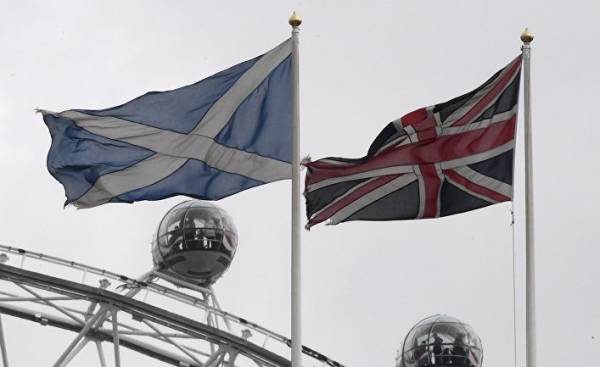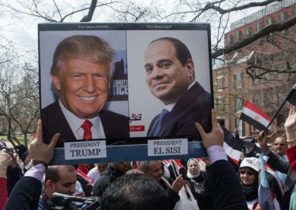
Theresa may has faced opposition from Scotland, which is seeking a referendum on independence.
During the campaign prior to the referendum, opponents of Breccia threatened by the possible separation of Scotland in the event of a British exit from the European Union. Europhobia were all regarded as attempts to intimidate people. But now, nine months after voting for Pexit, the mechanism of Scottish independence, who brought victory for “no” in 2014, begins to work with redoubled ardor. During the referendum on Brexia in June 2016, 62% of Scots voted to stay in the EU. The reluctance of London to take this fact into account, and the eventual start of the procedure the government Theresa may reinforce the rhetoric of the nationalists to stay in Europe, you need to get out of the UK.
The leader of the Scottish national party and Prime Minister of Scotland Nicola Sturgeon (Nicola Sturgeon) said March 13 that he would appeal next week to the local Parliament with a proposal to hold a new referendum on independence in autumn 2018 and spring 2019. The Prime Minister wants to prevent Scotland was forced to leave the EU “against the will”. Its decision is justified by the change of the situation in relation to the situation during the last vote in 2014.
“I think it’s important that Scotland should be able to decide their own future, ( … ), until it was too late,” she added solemnly at his residence in Edinburgh. In other words, all you need to do before the expiration of the two-year period of negotiations with the EU.
The statement of Nicola Sturgeon has hardly become for someone a surprise: she pressed the last few weeks with repeated warnings. Anyway, her point, apparently, is intended to affect the schedule of talks may with Brussels and speaks about the intensity of the looming struggle. A few hours after the speech, Scottish leader, Downing street announced that the procedure of Brexia will not start Tuesday as expected, and at the end of the month. At first glance, nothing serious, because the deadline has always been March 31. But the desire not to view that the pressure of the Scots produce some effect may also have played a role.
A new referendum, which demanded a Scottish Prime Minister (in September 2014 against independence voted 55.3% of voters), will be a “split factor” and will create “huge economic uncertainty at the worst possible moment,” said Theresa may. “The narrowness of the views that we have seen today, the Scottish national party, unfortunate”, she added, accusing the party that she thinks primarily about their own interests and not the interests of the Scots, and considers politics a “game.”
A vote for the Scottish Parliament appears to be a pure formality, because the Pro-independence parties (SNP and Green) belongs to the most places. Anyway, for the organization of a referendum to Edinburgh requires the consent of the British government and Parliament. Theresa may has tightened the tone about the protection of the “precious unity” of the Kingdom has not yet revealed their intentions for this reason. Although by law she is entitled to block the Scottish referendum, it is difficult to imagine how she could justify it politically. In the end, Brakcet was motivated by the desire of the English and Welsh to show that the sovereignty of London stands above Brussels. In such circumstances, it would be possible to deny the Scots the opportunity to make a choice?
The center of confrontation between Edinburgh and London nationalism may be the date of the referendum. Stargen is committed to hold a vote before the final entry into force of Breccia in the spring of 2019, but the government may have every reason to think about his transfer. First of all, the Scottish Prime Minister wants to influence the start of negotiations with Brussels. She expects a difficult process with the result in the form of “hard Breccia” (the disruption of trade relations), or even their failure, to thereby pre-heating the anger of Scottish nationalists and to reinforce arguments in favor of divorce with London.
So far, the initiative puts the Stargen may before a political dilemma. If she will continue to advocate for “hard Brakcet”, then confirm voiced by Scots to the British accusations of arrogance and will boost the vote for independence. But if it will soften its stance and will maintain links with the single market, it will ignite the fury of the europhobia of his party, in need of complete rupture and independent trade agreements with the Commonwealth (they believe that it will bring mountains of gold).
Thus, Nicola Sturgeon breaks the negotiations and becomes a hindrance to Breccia. Once her claim about the special status of Scotland preserving the ties with the EU after Breccia was rejected by Theresa may (the”wall of intransigence,” according to Sturgeon), she claims that she has no choice but a referendum on independence. In his desire to please Brussels, she presses on the commitment of the Scots to the EU. Quite a rare position in our time.
Mei, in turn, fears that the debate around Scotland could complicate negotiations with the European Union and to distract the forces of the British officials from the chief: future trade relations with the EU. British Prime Minister receives almost no help from Jeremy Corbin (Jeremy Corbyn), the leader of the labour party, who oppose Scottish independence. Its Saturday stating that a new referendum on independence would be “perfectly normal”, he was struck by the their Scottish friends, but then backpedaled, as always, blame everything on the media. “Independence would be a disaster for many people in Scotland”, in the end, he said.
Anyway, supporters of independence are not guaranteed victory in a new referendum. Falling of quotations of oil from the North sea, weak growth (0.7% vs. 2% on average in the UK), the uncertainty of the currency and concerns about the emergence of the border with Britain (trade with her four times higher than with the rest of the EU put together) can cool the ardor of the Scots. In the polls, independence is ready to support from 46% to 51%. Nicola Sturgeon, in turn, relies on Brakcet and steadfastness Theresa may, to push their vision of the future.







